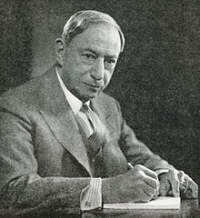|
January 1960 Radio-Electronics
 [Table of Contents] [Table of Contents]
Wax nostalgic about and learn from the history of early electronics.
See articles from Radio-Electronics,
published 1930-1988. All copyrights hereby acknowledged.
|
Imagine how amazed and
pleased the electronics pioneers would be to see how far the science has progressed
since they last walked the Earth.
Hugo Gernsback, who had
as the founder and editor of multiple electronics magazines and books been writing
about, designing, and building electronics devices since the early days of the last
century, is surely amongst them. In this "Automation in Electronics" article in
a 1960 issue of Radio-Electronics, Mr. Gernsback alludes back to the
year 1773 to declare John Joseph Merlin's
Silver Swan
automaton as the world's first instance of automation (a little research to
discover that). Electronics, in conjunction with equally ingenuous mechanical
contraptions, has continually provided the means of replacing tedious, sometimes
dangerous, repetitive tasks with automated processes. He cites AT&T's
electronics telephone circuit switching systems as an excellent example.
Distractors did then and still do today claim automation displaces human
workers, but the fact is employment ends up increasing as more users of the
goods and services pay hard-earned money for the convenience. These days,
unfortunately, we need automation to do the jobs lazy people who prefer handouts
from the government refuse to do.
Here is an example of which I speak.
Automation in Electronics ... Without Automation, Electronics
Could Not Exist ...
 by Hugo Gernsback by Hugo Gernsback
Technical people are constantly astonished and nonplussed when they read the
current polemics about automation and its supposed resulting unemployment.
To them it is clear that automation, with us since 1733, creates more employment
in the long run. True, automation may at times cause dislocation in certain industries,
but never for very long.
Let us take an outstanding example. In 1920, the American Telephone & Telegraph
Co. had only manual operators, a total of 228,900 employees. There were 8,000,000
phones at that time. Then it turned to automation - the dial telephone system -
eliminating nearly all hand-switchboard operators. Today, AT&T employs nearly
750,000 workers and we have over 70,000,000 phones! Such a quantity of phones could
not be handled by manual operators - the phenomenal growth of the telephone industry
has been made possible by electronics. But automation, instead of decreasing the
number of employees, has vastly increased it. More skilled and specialized jobs
have been opened up by electronics than were eliminated when electronic circuits
and devices replaced operators.
A few years ago, the Corning Glass Co. with a small staff turned out hand-blown
20-inch television glass picture-tube shells for $75 apiece - at a loss. Then they
built an automatic machine that turns out 21-inch tube shells for $9.89 each at
a profit! On top of this, Corning now employs 2,000 people on TV picture-tube manufacturing
- people who have jobs that never existed before!
It is incomprehensible that so many people fail to understand that automation
means new things in nearly every instance. And new things mean more work.
Consider the following: We will mention only a single industry, radio electronics.
In 1929, only 30 years ago, many of our radio receivers were still battery-operated.
There were less than 11,000,000 radio sets in the United States then. In 1959, there
were over 150,000,000. Most of the present-day radio tubes were unknown. Television
was in the laboratory blueprint stage. Coast-to-coast broadcasting hookups were
entirely via land lines. The coaxial cable still was in the future, as was microwave
relay cross-country transmission. In 1929, there were no transistors, no light portable
radios with concealed aerials, no pocket radios, no high fidelity, no stereo, no
FM broadcasting, no magnetic recording tape, no germanium rectifiers, no proximity
fuze, no radar, no guided missiles, no electronic instrument landing for airplanes,
no handy-talkies, no practical two-way mobile radio, no radio astronomy, no electronic
computers, no ultra-high-frequency transmissions, no atomic batteries, no solar
batteries and none of several hundred other radio-electronic inventions commonplace
today, but unknown a quarter-century ago.
In 1929, the radio-electronics industry was small and insignificant. Today it
has achieved an annual turnover of almost $14,750,000,000! It employs over 1,000,000
people, all on jobs that did not exist 25 years ago.
Many of these radio-electronic items are now made by automation, with more being
manufactured in this manner constantly.
Is it not elementary that only mass-produced articles - consequently only articles
that are in constant demand - are turned out via automation?
An automation machine calls for a capital investment of from $50,000 to over
$1,000,000. Would anyone in his right senses spend such sums if the end product
to be automated did not already have a huge market?
What usually is not realized is that nearly every new and successful invention
spreads out continuously, creating endless new branches like a living tree. Take
the telephone, the automobile, the airplane, television - each has thousands of
new facets, all creating new employment where none existed before.
Add to this our rapidly growing population that increases demand of most items
constantly. Under such pressure even automation, at times, falls behind.
Automation in our present technological age is the one absolutely necessary link
to allow us to expand indefinitely. Without automation, our industry would choke
from constant bottlenecks. Without it, our rapid industrial growth would be impossible
despite new inventions and new devices. Today our population numbers nearly 180,000,000.
By 1975, there will be 200,000,000.
Full automation by that time will supply most of our needs and give us a shorter
working day with far more leisure.
- H.G.
Posted January 18, 2023
|









 by Hugo Gernsback
by Hugo Gernsback